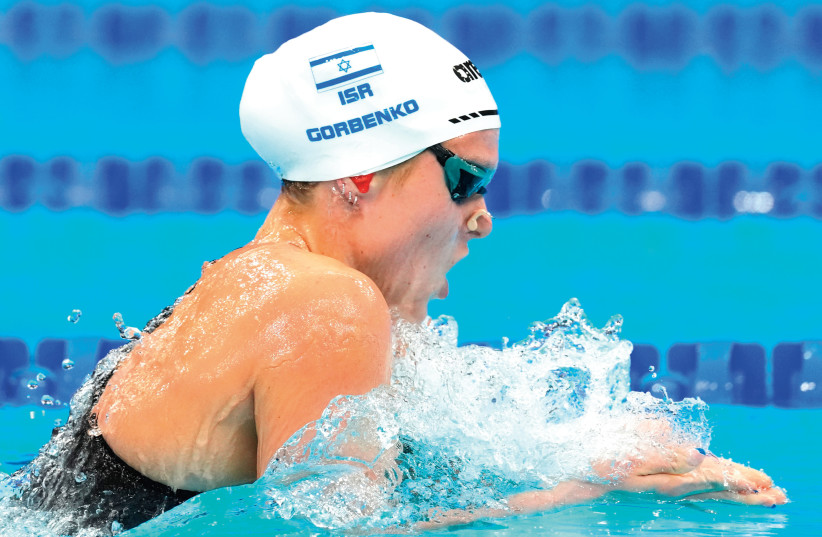On Sunday, the 20-year-old swimmer from Kiryat Yam made Israeli sports history by medaling at the World Aquatics Championships in the women’s 400 meters individual medley, taking the silver just a fragment of a second behind Freya Colbert, the gold-medal winner from Britain.
But that is not what makes her a metaphor for Israel. It’s how she did it.
Gorbenko won the silver medal in Doha, Qatar, amid boos from the crowd. They booed her as the race ended, they booed her when she got out of the pool, they booed her when she was conducting a post-race interview, and they booed her as she stood on the medal podium.
They booed her throughout the week of the competition. But it didn’t faze her.
Gorbenko heard the boos and just kept on swimming, faster and faster, one stroke after the other, doing what she knew how to do, what she had to do, regardless of how the spectators felt or how much some of them jeered.

But, to be sure, not all the noise was boos. Some cheered in the stands, trying to drown out the jeers.
This is truly a metaphor for Israel, a country that is doing what it needs to do in Gaza to ensure its existence in the region, tuning out the jeers from many in the international community. And, as was the case with Gorbenko, not all the noise is that of those jeering, there are also those giving the country support.
“I’ve been here a week. I heard all these noises, but I’m with earplugs. I’m in my zone. I’m here to do what I love to do, which is sports,” Gorbenko said.
Imagine a spokesperson for Israel saying something similar: “We’ve been here (in this war) for nearly five months. We hear all these noises, but we’re with earplugs. We’re in our zone. We’re here to do what we love to do, which is survive.”
With tremendous grace, Gorbenko told the interviewer after the race, “I’m just so happy to be here and represent my country in this hard time. Being here with the Israeli flag means a lot to me and my country, so that’s the best I can do.”
“I’m here to represent my country,” she told another reporter. “And I’m doing this with the Israeli flag and I’m proud of that. And whoever doesn’t like it, it’s just not my problem.”
Asked how it felt to do so well precisely in Qatar, Gorbenko said of the country that houses Hamas’s leadership and has for years given the terrorist organization diplomatic and financial support, to say nothing of a propaganda arm in Al Jazeera: “First of all it is moving to be here with our flag … I am happy that I did this despite them.”
She dedicated the medal to a classmate, Matan Angrest, who is a kidnapped soldier being held in Gaza.
“He was in my class for three years, and it’s surreal that he’s a friend that I would always see in the gym. He is there in Gaza, and they don’t know what’s going on with him,” she said.
At a time when Jews abroad are intimidated into hiding any manifestations of Judaism or Israel, such as a kippah, a Star of David necklace, or even a T-shirt with Hebrew writing, to watch Gorbenko proudly represent Israel as she did – and just let those haters stew – was a soothing elixir.
Many Israeli athletes have been performing at the highest level internationally during the war
Gorbenko is not the only Israeli athlete to have excelled recently. Just a month ago, an Israeli stood on a medal podium in Qatar but rather at the top of the medal podium, as Israel’s national anthem was being played and its national flag displayed.
Qatar, which is trying to win over the hearts of the West and cover up its authoritarian monarchy, abuse of migrant workers, and longtime patronage of the Hamas terrorist organization by hosting one sporting event after the next, played host to a major fencing event in January: the Doha Grand Prix. Little did the organizers imagine that the event would be won by 29-year-old Yuval Freilich, who competed with the words in Hebrew “Am Yisrael Chai” (The People of Israel Lives) on his shoulder.
Gili Lustig, the CEO of the Israeli Olympic Committee, was quoted as saying that “winning in Qatar and waving the Israeli flag in times like these on this unique stage is Israeli pride at its peak.”
Just a few days before Freilich’s success, Israel’s under-20 hockey team won the gold medal at an Ice Hockey World Championship Division III tournament in Sofia, Bulgaria. What made that victory even sweeter is that, at first, the IIHF said Israel would not be allowed to participate to ensure the safety of all participants.
The team successfully fought that outlandish decision, got it overturned, then went to Sofia and won the tournament.
And then again last week, an Israeli windsurfer, 21-year-old Sharon Kantor, won a gold medal at the IFCA World Championships in the Canary Islands.
While it is, of course, nice to win, that is not what is so significant about these athletic feats. Rather, it is the way these athletes so proudly and unapologetically represent their country, sending a powerful message to those trying to demonize Israel that we are here, we are strong, we are proud, and we will neither be distracted nor deterred by all the hateful noise.
Swim on, Anastasia.•
